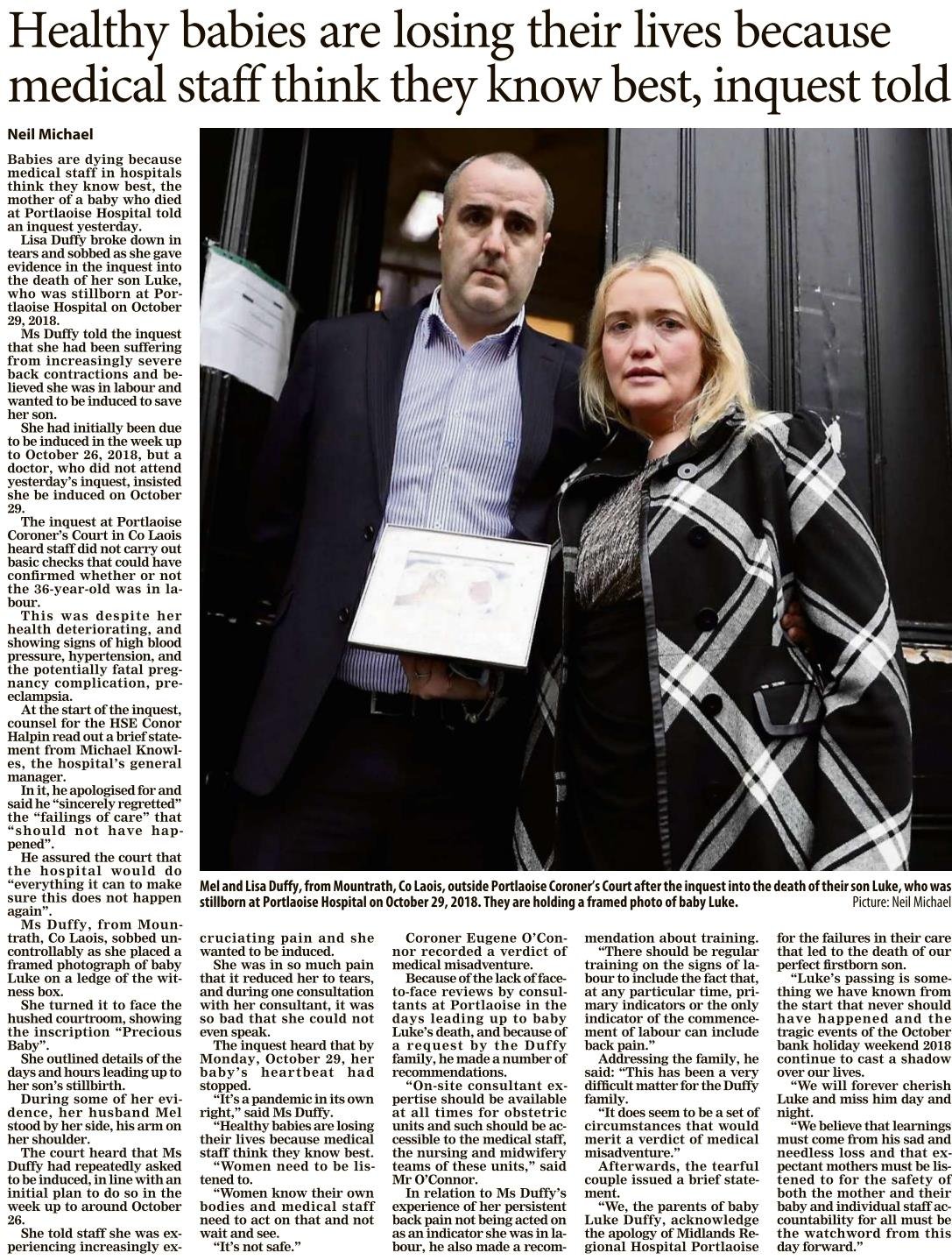When Lisa Duffy took to the witness stand at her son’s January 2022 inquest, it was little wonder she had tears in her eyes. She sobbed uncontrollably as she gave evidence at the inquest into the death of Luke, who was stillborn at Portlaoise Hospital on October 29, 2018.
Ms Duffy told the inquest she was suffering from increasingly severe back contractions at the end of her pregnancy, believed she was in labour and wanted to be induced. She was initially due to be induced in the week leading up to October 26, 2018, but a doctor – who was not present at the inquest – insisted she be induced instead on October 29.
The inquest at Portlaoise Coroner’s Court in Co Laois was told staff at the hospital did not carry out basic checks that could have confirmed whether or not the 36-year-old was in labour. This was despite the fact Ms Duffy, from Mountrath, Co Laois, was showing signs of high blood pressure, hypertension, and the potentially fatal pregnancy complication, preeclampsia.
Luke and his mother’s story was a tragic echo of stories told over and over at previous inquests.
And like so many other of those stories, it led to recommendations being made to help ensure there would be no repeat of the mistakes made in Baby Luke’s delivery.
The verdict of Medical Misadventure may not have been a surprise to Lisa and her husband Mel, but it was no comfort to a woman who believes to this day she should never have seen the inside of a Coroner's Court if only she had been listened to and her concerns acted on in a timely fashion.
Fast forward to September, 2023, and yet again, a Coroner’s Court heard of the anguished sobs of yet another mother. This time it was Hilary Murphy, at the inquest of her son Ódhran, who died at Portlaoise Hospital on December 28, 2021.
One of the most harrowing moments in the two-day inquest was when the inquest heard how Hilary and her husband Patrick were forced to bury their stillborn son in two separate funerals more than 11 months apart.
This was because a State perinatal pathologist, Dr John Gillan, who carried out an autopsy into his death had held onto a number of the baby’s organs.
Hilary, from Mountmellick, Co Laois, said the sight of her husband Patrick walking in the back door of their home “with a second white coffin” would always haunt the couple.
She said they had to fight a “relentless mental battle” to get his organs back and she sobbed from the witness stand as she said the couple still did not know why their baby’s organs — including his brain — had been retained.
The inquest - also covered by RTE - also heard that up to three care standards were not being adhered to at the hospital.
Like the inquest into Luke Duffy, Baby Ódhran’s also ended in a verdict of medical misadventure.
A day later, a group campaigning for better maternity care in Ireland called for an urgent review of maternity services at Midland Regional Hospital in Portlaoise.
The call was from from the Association for Improvements in Maternity Services (AIMS Ireland) chairwoman Krysia Lynch.
At the very least, she felt the now former Chief Medical Officer Tony Holohan should head back to Portlaoise and review maternity services there.
Dr Holohan had, after all, been sent there in 2014 when RTE Investigates broke the Fatal Failures investigation into avoidable baby deaths at the hospital between 2006 and 2012.
The babies were Katelynn Keenan, Nathan Molyneaux, Joshua Keyes-Connolly, and Mark Molloy.
Roisín Molloy’s son died 22 minutes after he was delivered at Portlaoise Hospital in January 2012.
Since then, she and her husband — also called Mark — had campaigned relentlessly for open disclosure and accountability in the health service.
Mr Holohan's highly critical Portlaoise report led to reviews, reports, and eventually a new national maternity strategy with enhanced national guidelines and standards.
Given a rising death toll in recent years, one might have thought there might at least be a look back, but it was not to be.
This is because both the HSE and the Department of Health did not deem it necessary.

